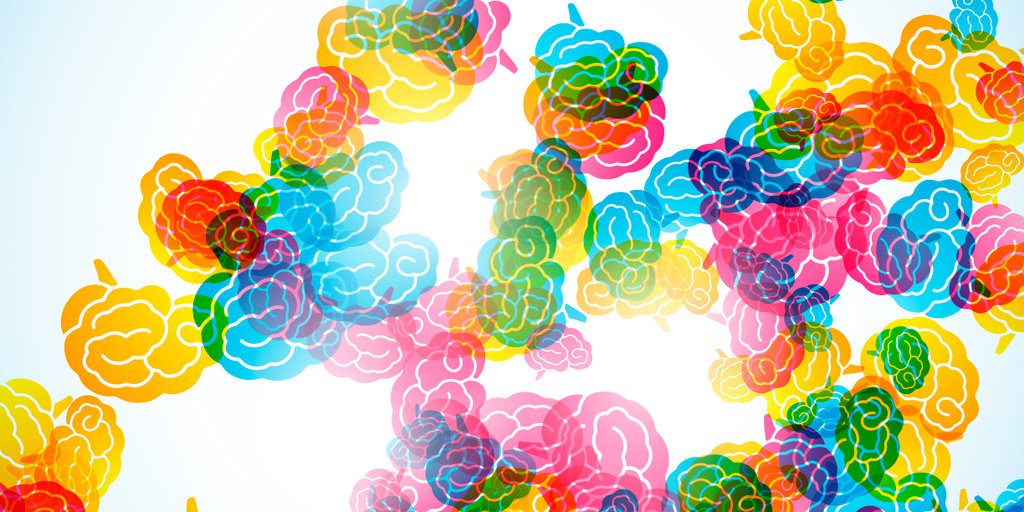Hey y’all – try saying that title three times fast!
Here’s a little something for you from Merriam-Webster:
Definition of neurodiversity
1: individual differences in brain functioning regarded as normal variations within the human population
Perhaps our difficulty in accepting and adjusting to these differences points to a limited understanding of the neurodiversity that surrounds us.
— Serena Puang
2: the concept that differences in brain functioning within the human population are normal and that brain functioning that is not neurotypical should not be stigmatized
OK, yes, I’m stalling a little on my content here. Every year there’s an opportunity for me to write a post about ADHD, autism, or some other brain condition, and every year I hesitate.
Current understanding of the term “neurodiverse” often includes autism spectrum disorder, ADHD, dyslexia, OCD, depression, and often other differences (and the debate continues). However, if you look back at that definition, the phrase that stands out to me is “regarded as normal variations.” Hmmm.
For the purpose of this post, I’ll focus on what I encounter most often in my coaching/organizing adventures, which is primarily ADHD, frequently mixed with other diagnoses.
Hey, here’s a cool graphic of a brain:
Why do I stall?
I once wrote an “ADHD” post, a long time ago, regretted it, and took it down. I originally included information about ADHD and other types of neurodiversity in my book, and then edited it all out.
Someone once asked me why I don’t write “tips” for ADHD since that’s my niche. Well, for starters, I’m not diagnosed with ADHD (although I have loved ones who are), so it feels presumptuous. For next-ers, I’m all too aware that neurotypical tips or “hacks” (and boy, do I dislike that word) generally don’t work. Not that I would couch my suggestions that way, but they’re still coming from me, and in the immortal words of Popeye, “I yam what I yam.”
I also stall because I’m not entirely sure who the audience is. Am I speaking to my clients? Colleagues? The general population? What the heck, let’s go with all of it.
And lastly, perhaps most importantly, I hate to make blanket statements about a particular group of people. Remember that these are variations we’re talking about. It’s kind of like different covers of the song “Yesterday.” Some are better than others, and there’s only one we might consider the “normal” rendition (aside: did you know that there are over 1600 recorded versions of it? Yes, I’m stalling again…).
Time for another brain pic:
Anyone besides me feeling some Pink Floyd vibes here?
But seriously, folks, if I put it out there that I’m some sort of expert, and I make the statement:
“Timers are a great way to stay on track for someone with ADHD when they’re trying to complete a task…”
inevitably there will be someone out there with ADHD, reading my blog, for whom timers are a terrible idea. The sound of the timer going off will disrupt their train of thought, or they will learn to ignore it, or it will increase their co-occurring anxiety, or whatever. And then this someone might feel like there’s something wrong with them because they couldn’t get the “ADHD tip” from the “expert” to work.
And yes, there are lots of assumptions coming into that scenario, but I know it can happen. I’ve seen it happen.
With all due respect to esteemed colleagues, I’ve even been listening to classes or conference sessions where someone who is an expert – maybe even diagnosed with some sort of neurodiversity – makes blanket statements. I cringe. And don’t get me started on TikTok and other social media. Some information out there is solid, some well-meaning and regrettable, and some just plain awful. Scrollers beware.
My wise friend and colleague, Terry Huff (who wrote Living Well With ADHD), once told me that I’m an ADHD Watcher. I’m good with that descriptor. I’ve taken tons of classes; I even help teach one on brain-based conditions. I listen to and observe clients with all sorts of diagnoses, talk with neurodiverse family members and friends, and spend two Monday nights every month in a room (now virtual) where I’m the only person in about 20 or so, that is “neurotypical.”
I guess you could say I’ve been in an immersion program for the last seven years. But I can’t presume to know exactly what’s going on in any of the brains I encounter (or the hearts, for that matter).
I’m not going to tell you what people who are neurodiverse specifically should do to be more organized. There is no “best planner” for ADHD (there are many good ones – plural). There is no “foolproof method” for helping someone diagnosed with ADHD or autism or anxiety or depression get, and stay, organized and productive – any more than there’s a foolproof method for any of us.
So what could, or would I want to say about all of this?
First, borrowing from another favorite author, Don Miguel Ruiz, and his book The Four Agreements:
Never make assumptions.
Don’t make assumptions about what you can or can’t do or what someone else can or can’t do. What may or may not work. Never make assumptions about how neurodiversity shows up for someone (it’s all along a spectrum). There are a lot of folks out there walking around without a diagnosis. There are also a lot of folks walking around out there with the wrong diagnosis.
We can’t say for sure what method or tip will click until we experiment. We need to stay open to possibilities, rather than shutting them down with some sort of stereotype, or the belief that we know what’s best for ___X___ kind of people. Assuming you’ve found the perfect solution for an organizing issue based solely upon a brain condition can be confusing at best and damaging at worst.
Freeing yourself up to try things in different ways, without judgment, is the only foolproof method I know. Listening to your intuition, stepping back, and asking yourself what makes things easier for you (not prettier, or fancier, or God forbid, more neurotypical) is the best hack. You might need a professional organizer or coach or other professional to support you in that process, but you can own it.
And second:
Look at yourself (or your neurodiverse friend, family member, etc.) as a whole person.
I won’t say that ADHD or another known diagnosis never enters my head when I’m working with someone. It has to – I have to keep all I’ve learned in mind, and it’s essential information. But it’s certainly not the only thing I’m seeing. Often, it sits second chair to something else that’s stronger, like innate intelligence, humor, or determination.
There are strengths, creativity, passions, values, perceptions, and, yes, challenges that are unique to each person, and that’s where the gold is. Given the opportunity and space, most people can come up with life order ideas that totally eclipse anything I could suggest.
Time to wrap up. I hope I’ve made some sense here, and kept it respectful. As always, I’d love to read your thoughts and comments.
*Many thanks to Janet Barclay and her Organizer’s Blog Carnival for the inspiration (and perhaps needed push) for this post.






“ADHD watchers” like you have enhanced the quality of my life, and I’m grateful. You learn a lot when you’re close to it. All of us in the ADHD family need to have ADHD watchers around us, and ADHD coaches are such an important resource. My wife is an ADHD watcher by necessity. Her acceptance of my episodic lapses in memory and attention, and my perpetual struggle with organization, has been so important to our relationship and my productivity. And she likes that I’m not shy, despite the risk of embarrassment that comes with the disinhibition. She has always supported my relationship with my writing tools and hobbies and has learned to forgive my missteps.
Thank you, Terry. I think those of us who are ADHD watchers need the ADHD family as well, for so many reasons. Think about how much YOU have enhanced the quality of life for others, ADHD or no. My book would have never made it out of my computer without your help.
I appreciate you addressing neurodiversity. You don’t have to be an expert on it to talk about it, you just have to care. And you certainly do. As a pediatric nurse, I appreciate your dialogue and I know that your words will help others. Thank you!
Thanks so much for reading and commenting, Lynn – your appreciation means a lot to me. Hope you are doing well!
I love this: “You don’t have to be an expert on it to talk about it, you just have to care.” I suspect it could be applied to other areas as well!
Absolutely, Janet!
Very thoughtful and kind post, Sara. It seems for every rule, there is an exception. Blanket statements can get us into trouble, but when can offer a variety of tools, with a clear disclaimer that one size does NOT fit all, in clothing or anything else.
Watching and listening keeps the learning going on for us, and ultimately helps anyone we come into contact with, right?
Absolutely, Seana. Isn’t it more fun, anyway, to have a variety of options? We’d all be pretty boring if everyone color coded and filed the exact same way. Thanks for commenting!
Although I work in the same field as you, I consider myself far less of an “expert” on ADHD and other aspects of neurodiversity, but I’ve always had this same feeling that presenting something as a solution (full stop) just makes those for whom it doesn’t work feel worse than they already did. Whether I’m speaking with a neurodiverse audience or client, or am with those who consider themselves neurotypical, I’m always pointing out that I’m presenting OPTIONS, which MAY work, for SOME people.
There are those who find this approach wishy-washy, like the famous author/TV star organizer whose first book literally stated that if you followed her advice, which she considered the only working solution, then you’d be organized for life. I cringed, knowing how many people, but especially those who are neurodiverse (and particularly people with ADHD, executive function disorders, TBIs, and clinical depression) would feel cowed by this. But certitude is for engineers; human beings require more leeway.
Mostly, I found this post echoes what we see in the diabetes community. There’s good advice, mediocre but well-intentioned advice, and BS out there. When experts say, “do this” or “don’t eat this” and promise following the advice will accomplish those goals, the real experts (the people who live with the situation, day in and day out) know that no one solution works for everyone. In the D-community, we say “my diabetes is not your diabetes” and that’s not merely true of Type 1 vs. Type 2, but from person to person, just as with neurodiversity, we each respond to different stimuli in different ways. Blanket advice, without a disclaimer, hurts far more than it helps.
Caring is the first step, and it’s easy to see that your wisdom is packaged in care.
“My diabetes is not your diabetes,” reminds me of “If you’ve met one person with ADHD, you’ve met ONE person with ADHD.” I hadn’t stopped to think about blanket advice being offered in the diabetes world, but what you say makes so much sense. Is it because certain people in these communities want so badly to make a difference that they hope their advice applies to everyone? I hope it comes from a desire to help, but it still causes problems, doesn’t it? Thank you for your thoughtful comment, Julie!
What an important and compassionate message, Sara! I love how you lean into seeing a person as a whole person and not as their diagnosis or challenges. When we approach people (clients, family, friends, colleagues, strangers) in that way, the world opens up for them and for us. Life becomes an experiment, a curiosity journey, and one where we can help facilitate the deep knowing that most people have about themselves, but might find it challenging to bring to the surface.
I’m with you 100% that there is no “one way” to organize, not specific tips or “hacks.” Getting organized and being productive in a way that works for you is unique to the individual. Thank you for saying it so boldly and respectfully.
Thanks, Linda. Finding that uniqueness is what makes this work so enjoyable for me. Spaces are different, people are different – it’s always confused me to think about not organizing differently.
Great piece, Sara! Each of us in my nuclear family is “diagnosed” with one or more labels, so this really hits home. What can I say? Our dinner conversations are never boring! Whether it’s ASD, ADHD or anxiety, I have learned time and again that it’s personal. Always unique. And I have hated labels following my kid b/c of that. So, thank you!
You’re so welcome, Laura – I’m imagining some really fun and unique dinner convos :-). Thanks for stopping by and commenting!
Sara, this post is a great converation starter! I serve the neurodiverse community but my comfort in this area is first and foremost, due to my daughter being neurodiverse and knowing that I don’t “fit the mold” either (never been labeled). I completely agree that when you’ve met one person with ADHD (or Aspergers or OCD or Bipolar…), then you’ve met one neurodiverse person. Everyone is different.
Speaking with and organizing with this community has taught me to listen more, be open and flexible and to experiment – as you have mentioned in this article, a key element. Another extremely important approach is to concentrate on one’s strengths over one’s deficits. Someone who’s brain is wired differently has been raised with neurotypical education; by the time that person is an adult, he/she has been through the wringer. We’re talking shame and a feeling of “less than.”
Thanks for bringing up this topic in such a thoughtful exploratory way!
Yes, listening is so important. Giving people an opportunity to speak what’s true for them, what makes sense to them, AND what they believe their strengths to be is key. Thanks for stopping by and sharing your thoughts, Jill!
Very thoughtful post. I’m an HSP and there are people with ADHD and empaths in my family.
I adore working with my ND clients – not thinking I have all the answers for them, but as a coach, thinking I will come up with good questions to consider.
After all, productivity is personal for all of us, neurodivergent or not.
Absolutely – it’s never one-size-fits-all is it? Thanks so much for the comment, Clare!